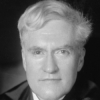Benjamin Cardozo

Benjamin Cardozo
Benjamin Nathan Cardozowas an American jurist who served on the New York Court of Appeals and later as an Associate Justice of the Supreme Court. Cardozo is remembered for his significant influence on the development of American common law in the 20th century, in addition to his philosophy and vivid prose style. Cardozo served on the Supreme Court six years, from 1932 until his death in 1938. Many of his landmark decisions were delivered during his eighteen-year tenure on the...
NationalityAmerican
ProfessionSupreme Court Justice
Date of Birth24 May 1870
CountryUnited States of America
The great tides and currents which engulf the rest of men do not turn aside in their course and pass the judges by.
In our worship of certainty we must distinguish between the sound certainty and the sham, between what is gold and what is tinsel; and then, when certainty is attained, we must remember that it is not the only good; that we can buy it at too high a price; that there is danger in perpetual quiescence as well as in perpetual motion; and that a compromise must be found in a principle of growth.
We seek to find peace of mind in the word, the formula, the ritual. The hope is illusion.
History or custom or social utility or some compelling sense of justice or sometimes perhaps a semi-intuitive apprehension of the pervading spirit of our law must come to the rescue of the anxious judge and tell him where to go.
There is in each of us a stream of tendency, whether you choose to call it philosophy or not, which gives coherence and direction to thought and action. Judges cannot escape that current any more than other mortals.
The heroic hours of life do not announce their presence by drum and trumpet.
The validity of a tax depends upon its nature, and not upon its name.
Code is followed by commentary, and commentary by revision, and thus the task is never done.
Prophecy, however honest, is generally a poor substitute for experience.
The risk to be percieved defines the duty to be obeyed.
The heroic hours of life do not announce their presence by drum and trumpet, challenging us to be true to ourselves by appeals to the martial spirit that keeps the blood at heat. Some little, unassuming, unobtrusive choice presents itself before us slyly and craftily, glib and insinuating, in the modest garb of innocence. . . . Then it is that you will be summoned to show the courage of adventurous youth.
Fraud includes the pretense of knowledge when knowledge there is none.
I take judge-made law as one of the existing realities of life.
Rest and motion, unrelieved and unchecked, are equally destructive.